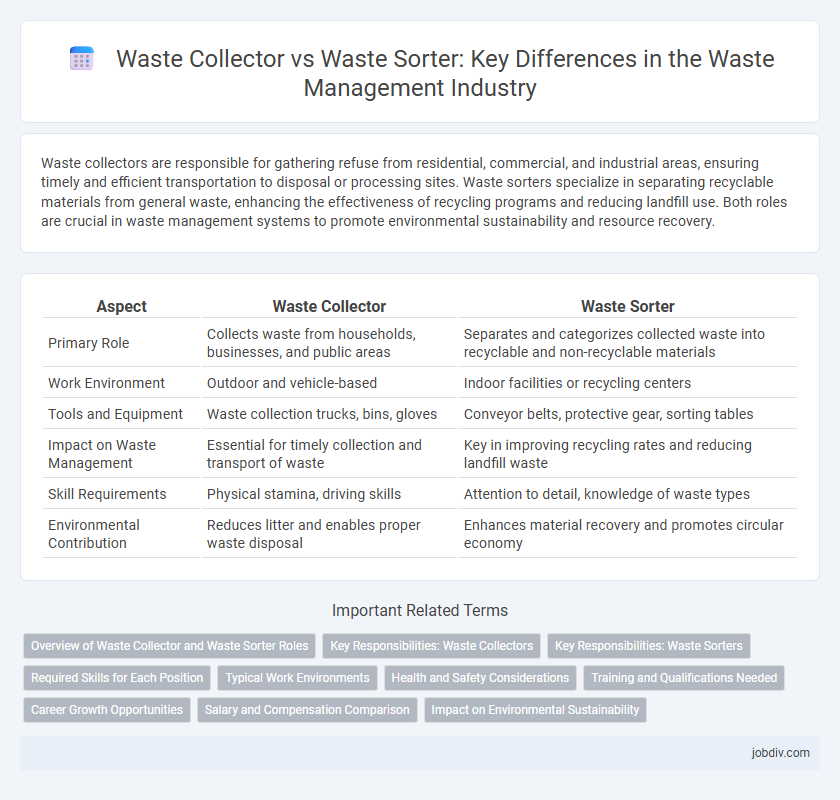Waste collectors are responsible for gathering refuse from residential, commercial, and industrial areas, ensuring timely and efficient transportation to disposal or processing sites. Waste sorters specialize in separating recyclable materials from general waste, enhancing the effectiveness of recycling programs and reducing landfill use. Both roles are crucial in waste management systems to promote environmental sustainability and resource recovery.
Table of Comparison
| Aspect | Waste Collector | Waste Sorter |
|---|---|---|
| Primary Role | Collects waste from households, businesses, and public areas | Separates and categorizes collected waste into recyclable and non-recyclable materials |
| Work Environment | Outdoor and vehicle-based | Indoor facilities or recycling centers |
| Tools and Equipment | Waste collection trucks, bins, gloves | Conveyor belts, protective gear, sorting tables |
| Impact on Waste Management | Essential for timely collection and transport of waste | Key in improving recycling rates and reducing landfill waste |
| Skill Requirements | Physical stamina, driving skills | Attention to detail, knowledge of waste types |
| Environmental Contribution | Reduces litter and enables proper waste disposal | Enhances material recovery and promotes circular economy |
Overview of Waste Collector and Waste Sorter Roles
Waste collectors are responsible for the systematic collection and transportation of waste materials from residential, commercial, and industrial areas to designated disposal or processing sites. Waste sorters focus on separating recyclable, compostable, and non-recyclable materials to ensure efficient waste management and resource recovery. Both roles are critical in maintaining sanitation and supporting sustainable waste management systems.
Key Responsibilities: Waste Collectors
Waste collectors are responsible for the efficient gathering and transportation of solid waste from residential, commercial, and public areas to designated disposal or processing sites. They operate collection vehicles, manage waste bins, and ensure strict adherence to safety and environmental regulations to prevent contamination and hazards. Their role is crucial in maintaining public hygiene and supporting effective waste management systems.
Key Responsibilities: Waste Sorters
Waste sorters play a crucial role in the waste management process by meticulously separating recyclable materials from general waste to enhance recycling efficiency and reduce landfill use. They identify and classify items based on material type such as plastics, metals, paper, and organics, ensuring contaminants are removed to maintain the quality of recyclables. Waste sorters often work in facilities equipped with conveyor belts and sorting machines, where their attention to detail directly impacts the effectiveness of waste recovery programs and environmental sustainability initiatives.
Required Skills for Each Position
Waste collectors require physical stamina, time management, and adherence to safety protocols to efficiently gather and transport waste from various locations. Waste sorters need keen attention to detail, knowledge of recycling regulations, and the ability to identify and separate materials accurately for proper waste processing. Both roles demand teamwork and a commitment to environmental sustainability to ensure effective waste management operations.
Typical Work Environments
Waste collectors typically operate in outdoor environments such as residential neighborhoods, commercial districts, and industrial zones, often exposed to weather elements and heavy traffic. Waste sorters usually work indoors in recycling centers or waste management facilities, where controlled conditions allow for efficient separation of materials using conveyor belts and sorting machinery. Both roles require adherence to safety protocols, but waste sorters benefit from ergonomic workstations designed to reduce physical strain.
Health and Safety Considerations
Waste collectors face higher exposure to physical hazards such as heavy lifting, vehicle traffic, and sharp objects, necessitating rigorous use of personal protective equipment (PPE) like gloves, helmets, and high-visibility clothing to minimize injury risks. Waste sorters encounter health risks from prolonged contact with hazardous materials, dust, and biological contaminants, requiring well-ventilated workspaces and protective gear such as masks and aprons to prevent respiratory and skin ailments. Both roles demand strict adherence to safety protocols and regular training to reduce the incidence of occupational illnesses and accidents in waste management environments.
Training and Qualifications Needed
Waste collectors require basic training in safety protocols, equipment handling, and route navigation, often necessitating a high school diploma or equivalent. Waste sorters need specialized training in material identification, contamination prevention, and use of sorting machinery, typically provided through vocational courses or on-the-job instruction. Both roles prioritize physical fitness and knowledge of environmental regulations to ensure efficient and compliant waste management.
Career Growth Opportunities
Waste collectors often start with entry-level responsibilities focused on the collection and transportation of waste, offering limited scope for upward mobility without further training or certification. In contrast, waste sorters can advance by gaining expertise in identifying recyclable materials, hazardous waste, and specialized processing techniques, leading to roles in quality control or facility management. Career growth in waste sorting frequently aligns with increasing specialization and technical skills, making it a pathway to supervisory or operational positions within waste management facilities.
Salary and Compensation Comparison
Waste collectors typically earn a median annual salary of around $38,000, while waste sorters earn slightly less, averaging $32,000 per year. Compensation for waste collectors often includes hourly wages plus benefits such as health insurance and retirement plans, whereas waste sorters may receive lower base pay with fewer additional perks. Salary variations depend on factors like location, experience, and employer, with unionized waste collectors generally securing higher pay compared to non-unionized sorters.
Impact on Environmental Sustainability
Waste collectors play a critical role in environmental sustainability by efficiently gathering and transporting waste to prevent illegal dumping and reduce pollution. Waste sorters contribute by separating recyclable materials from the waste stream, enhancing recycling rates and minimizing landfill use, which conserves natural resources and reduces greenhouse gas emissions. Optimizing both roles strengthens waste management systems, directly supporting circular economy goals and reducing overall environmental impact.
Waste Collector vs Waste Sorter Infographic

 jobdiv.com
jobdiv.com